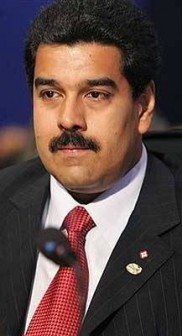CARACAS (Reuters) – Smarting from last weekend’s election defeat, President Nicolas Maduro warned yesterday of a “large-scale crisis” in Venezuela as a showdown looms between the socialist government and opposition-led legislature.
The Democratic Unity coalition took a two-thirds majority in the vote for a new National Assembly, giving it a powerful platform to combat Maduro’s government and potentially shake up institutions friendly to the socialists.
“We’re facing a large-scale crisis that is going to generate a power struggle between two poles: the patriots and the anti-patriots,” Maduro said in a speech to the military.
“A conflict which is going to create big tensions … It’s a counter-revolutionary crisis.”

Foreshadowing strife when the legislature begins on January 5, the opposition has said its priority is an amnesty law for jailed activists but Maduro insists he will refuse to sign.
In a bid to minimize the opposition’s room for manoeuvre, the outgoing assembly, dominated by the ruling Socialist Party, has passed extra budgetary credits and promoted the judge who jailed opposition leader Leopoldo Lopez.
The government is also pushing through new appointments to the Supreme Court where potential constitutional disputes between the legislature and executive could be decided.
Last weekend’s vote against Maduro’s candidates was largely seen as a protest against Venezuela’s brutal recession, the world’s highest inflation and shortages of everything from milk to medicines.
But Venezuelans fear the antagonistic political situation could further delay measures to address the crisis-hit economy, meaning potentially worse suffering in 2016.
Maduro has said inflation will near 100 per cent and gross domestic product may shrink 4 per cent this year. But the Central Bank has given no official data since 2014, and some economists estimate inflation is double that while this year’s GDP drop could be worse.
“We Venezuelans cannot allow ourselves to be distracted,” prominent opposition leader Henrique Capriles said on Saturday. “We have to demand solutions to the worst economic and social crisis in our history.”
In his more than two-hour speech yesterday, Maduro continued to blame business and political foes for an “economic war” against his country and said the OPEC nation’s oil revenues had plunged 68 percent in 2015 on the slide in prices.
Despite complying with heavy foreign debt payments, Venezuela’s risk profile had risen on markets, he complained.
“It’s a war, it’s a boycott. 2015 has been a terrible year … But we will face the difficulties with more revolution!”
